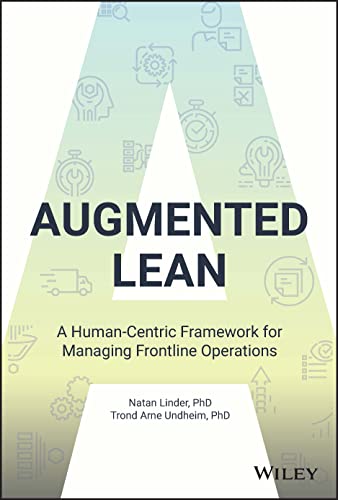 Over the long holiday weekend, I had a chance to reread Augmented Lean: A Human-Centric Framework for Managing Frontline Operations, by Dr. Natan Linder and Dr. Trond Arne Undheim. This is a book that I had been anxiously waiting to be released, so much so that I had preordered it from Amazon - which is something I rarely, if ever, do.
Over the long holiday weekend, I had a chance to reread Augmented Lean: A Human-Centric Framework for Managing Frontline Operations, by Dr. Natan Linder and Dr. Trond Arne Undheim. This is a book that I had been anxiously waiting to be released, so much so that I had preordered it from Amazon - which is something I rarely, if ever, do.
My interest in Augmented Lean is based on two things: My interest in what I would describe as the application of modern technology to improve the efficiency of manufacturing companies, and my familiarity with and respect for the authors.
About The Authors
I know of Natan through the work I've done using Tulip. Natan is Tulip's Cofounder and CEO. He's also the Cofounder and Chairman of Formlabs, and the fact that he's involved with both of those companies is, to me, beyond impressive.
I became familiar with Trond through his involvement with Tulip as well. He's Tulip's Lead Ecosystem Evangelist. I'm also a big fan of Trond's podcasts (Augmented, and Futurized), as well as his 2021 book titled Future Tech: How to Capture Value from Disruptive Industry Trends. He's also a Stanford University Research Scholar, a contributor to Forbes, a partner in an early-stage venture capital firm, and more. You can learn more about Trond on his personal Web site: https://trondundheim.com
I'm not sure when, or if, these guys ever sleep!
About The Book
In Augmented Lean, the authors convincingly argue that in order for manufacturing operations to get the full benefits of modern technology, they need to use a human-centered approach. While manufacturers may benefit from technologies such as sensors, artificial intelligence, automation, and so on, the real benefits come when technology is used to empower frontline workers.
Essentially, the authors suggest that we should start thinking of frontline workers as knowledge workers, and that we should provide them with the tools that they need to fully utilize their tacit, inherent knowledge and experience, and give them the trust and freedom to use and apply those tools. Tools such as low-code and no-code application development platforms (Tulip, for example), which can be used without the need for formal training or education. Tools that are flexible and intuitive enough that applications can be built quickly, and can be easily implemented, updated, and enhanced as needed, with minimum or no burden on an organization's IT resources.
I found Chapter 7, "Democratizing Operational Technology Using the Dynamic Capabilities of the Organization," to be particularly interesting. In it, the authors discuss no-code and low-code software development in general, and explain how these systems "unshackle" software development from IT. Perhaps most importantly, they explain that when an organization makes use of no-code and low-code systems, the role and responsibility of its IT department needs to adjust so that it provides guidance regarding "interoperability, coordination, and governance."
My Interest in Operational Technology
My interest in Augmented Lean, and in operational technology in general, is a result of work that I've been doing for a manufacturing client. Initially, my work for them almost exclusively involved enhancing and extending NetSuite (their ERP system). That eventually lead to helping them improve their NetSuite / Tulip integrations. That was my first real exposure to Tulip, and to manufacturing in general.
Throughout my career, I've had the opportunity to help clients apply technology to many business processes - from marketing and sales, to order processing and inventory control, to accounting and finance. And yet I've never been involved with - and to be honest, never even thought about - applying technology to manufacturing. So this is a new world to me.
In Episode 99 of the Augmented podcast, the authors discuss the process of writing the book, their goals with it, and more. In the episode, Trond made a comment that really hit home for me:
You can't just take a digital person who is completely digital native and say, "Welcome to the factory; just do what you do."
I'm not fooling myself into thinking that all I need to do to help a manufacturing operation is "write some code." I know that I need to get a solid understanding of manufacturing in general, to learn about the history of operational technology (what has worked and what hasn't), and get familiar with the challenges that manufacturers and their frontline workers are facing today. I think that the advice and insights found in Augmented Lean are going to be invaluable to me.
Wrapping Up
If you're interested in operational technology, then I highly recommend Augmented Lean. And if, like me, you also happen to come from a software development background, then I also encourage you to check out Tulip.